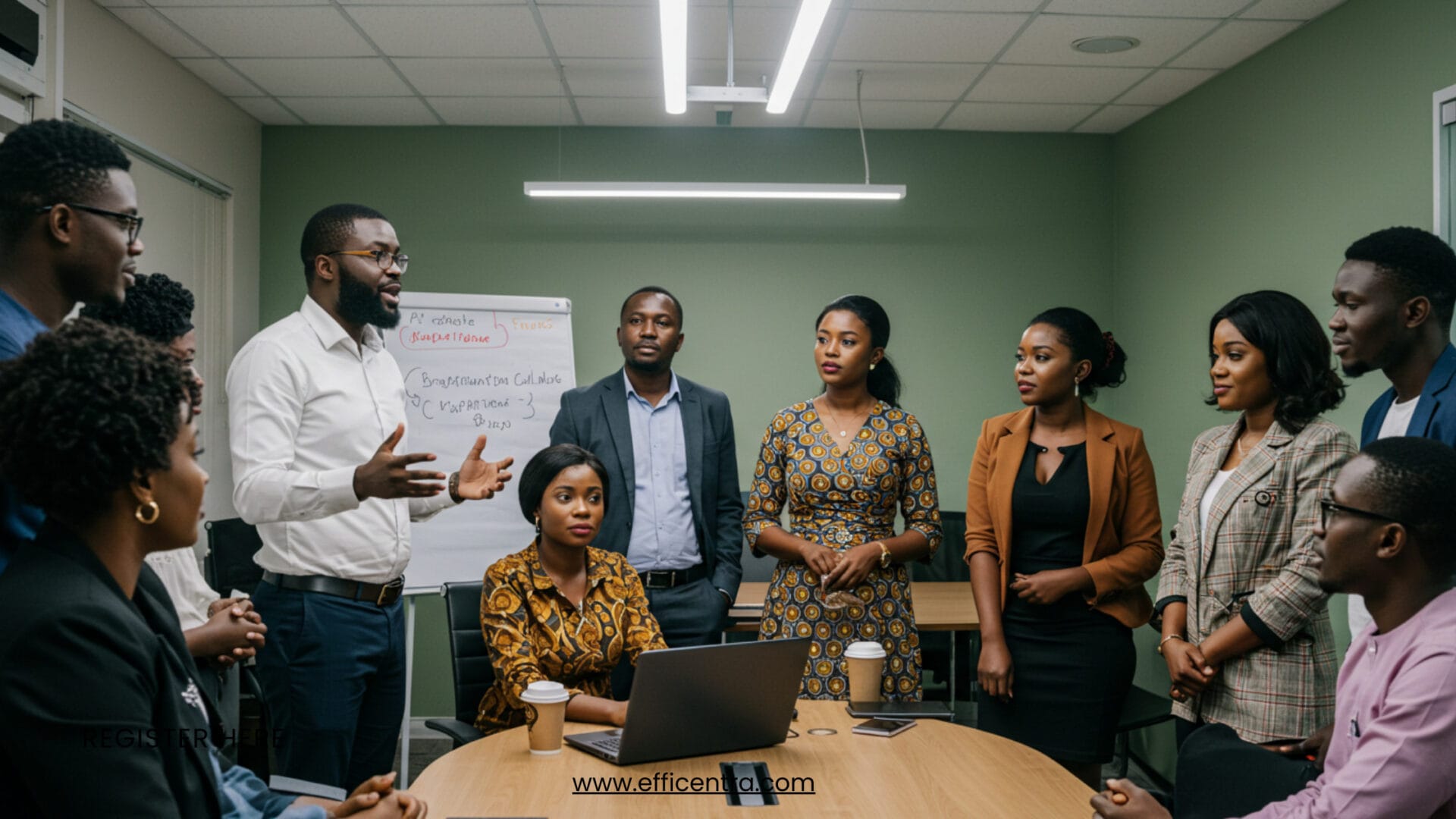5 Essential Skills Nigerian Professionals Need to Stay Competitive
Discover the 5 essential skills Nigerian professionals should develop to stay competitive in 2025. Learn practical strategies for career growth in Nigeria’s evolving job market.
Skilled Nigerian professionals are rapidly evolving in today’s dynamic job market. The Nigerian employment landscape is transforming at breakneck speed, driven by digital advancement, remote work adoption, and shifting economic priorities.
At Efficentra HR Solutions, we recently surveyed 500+ hiring managers across Nigeria’s leading industries. The results revealed a striking pattern: the skills that secured jobs just three years ago are no longer sufficient for career advancement today.
Whether you’re early in your career, looking to switch industries, or aiming for leadership roles, these five skills have emerged as non-negotiable for professional success in Nigeria’s evolving economy.
🎯 Why These Skills Matter for Nigerian Professionals
Skills Nigerian professionals need today are fundamentally different from what was required even two years ago. Success increasingly depends on your ability to work effectively across diverse teams, solve problems creatively with limited resources, and adapt quickly to changing market conditions.
The shift is happening because of:
- Technology Integration: Every role now involves digital interaction
- Remote/Hybrid Work: Managing relationships across distances
- Economic Uncertainty: Adaptability has become a survival skill
- Global Competition: Nigerian professionals compete internationally
- Regulatory Changes: Compliance affects everyone
The professionals thriving aren’t necessarily the most experienced; they’re the most adaptable.
💻 Skill #1: Digital Process Thinking
What it used to be: Basic computer literacy, Microsoft Office and email skills.
What it is now: Understanding how technology solves problems and creates efficiencies in any role.
Why It Matters
Every business process has a digital component. Professionals who identify inefficiencies and suggest technological solutions become invaluable to organizations.
Nigerian Context
With Nigeria’s digital economy push and fintech rise, even traditional industries adopt digital-first approaches. Understanding process automation and workflow optimization sets you apart.
How to Develop This Skill
- Automate one routine task using existing tools
- Learn basic analytics and dashboard interpretation
- Study workflow optimization and identify bottlenecks
- Ask “Could this be automated?” for repetitive tasks
Real Application
Instead of manually tracking attendance, suggest digital systems that integrate with payroll. Create auto-populating report templates rather than starting from scratch monthly.
🧠 Skill #2: Cross-Cultural Emotional Intelligence
What it used to be: Being “good with people” and understanding social dynamics.
What it is now: Navigating complex cultural dynamics while building trust across diverse teams, often through digital platforms.
Why It Matters
Nigeria’s workforce spans different regions, religions, educational backgrounds, and generations. Add remote work, and emotional intelligence becomes critical for success.
Nigerian Context
Success depends on working effectively with colleagues from Lagos to Kano, recent graduates to seasoned professionals, startups to traditional corporations. This requires cultural sensitivity paired with emotional intelligence.
How to Develop This Skill
- Practice active listening understand before being understood
- Study cultural communication patterns across Nigerian regions
- Develop empathy for others’ challenges and perspectives
- Master digital body language in written communication
Real Application
When leading diverse project teams, adjust communication styles for each person while maintaining consistent goals. Recognize when resistance might be cultural differences in expressing opinions.
🧩 Skill #3: Strategic Problem-Solving Under Constraints
What it used to be: Following procedures and escalating problems to managers.
What it is now: Creatively solving problems with limited resources while considering long-term implications.
Why It Matters
Nigerian businesses operate with constant constraints foreign exchange challenges, infrastructure limitations, budget restrictions. Professionals who innovate within constraints rather than being paralyzed by them create competitive advantages.
Nigerian Context
Every Nigerian professional encounters resource constraints regularly power outages, supply chain challenges, budget cuts. The ability to find creative solutions becomes essential.
How to Develop This Skill
- Practice constraint-based thinking: identify what you DON’T have, then focus on what you DO have
- Study how other Nigerian businesses solved similar problems
- Always have backup plans (Plan B and Plan C)
- Think systemically about how solving one problem affects others
Real Application
When budgets are cut, identify highest-value activities and find lower-cost alternatives. When internet is unreliable, develop offline processes that sync when connection returns.
👑 Skill #4: Collaborative Leadership (Without Authority)
What it used to be: Leadership meant having a title and directing people.
What it is now: Influencing outcomes through collaboration, regardless of hierarchy position.
Why It Matters
Modern organizations have flatter structures, cross-functional teams, and good ideas from anywhere. Leading without formal authority determines career trajectory.
Nigerian Context
Traditional hierarchies remain common, but successful companies adopt collaborative approaches. Professionals who navigate both traditional and modern leadership styles become invaluable bridges.
How to Develop This Skill
- Focus on influence, not control help others succeed
- Build trust through consistent actions and transparent communication
- Facilitate discussions toward solutions rather than imposing ideas
- Share knowledge and help colleagues develop skills
Real Application
In cross-departmental projects, success comes from understanding each department’s priorities and finding win-win solutions. Lead by asking better questions, not having all the answers.
📚 Skill #5: Continuous Learning Architecture
What it used to be: Complete formal education, then apply knowledge throughout your career.
What it is now: Creating personal systems for continuously acquiring skills and adapting to changing requirements.
Why It Matters
Skills have shorter lifespans now. What you learned two years ago might be obsolete today. Professionals who treat learning as ongoing process, not one-time achievement, stay relevant.
Nigerian Context
Nigeria’s economic landscape changes rapidly new regulations, technologies, market conditions. Quickly acquiring and applying new knowledge determines career resilience.
How to Develop This Skill
- Create weekly learning routines with specific time allocation
- Build diverse information sources: courses, articles, podcasts, mentorship
- Apply new skills immediately in low-risk situations
- Teach others to solidify your understanding
Real Application
Instead of waiting for company training, proactively identify skills gaps and create learning plans. When new regulations affect your industry, become the expert who helps others adapt.
📋 Implementation: Your 90-Day Development Plan
Month 1: Foundation Building
- Choose one skill for primary focus
- Identify specific improvement areas within that skill
- Find learning resources and practice opportunities
Month 2: Integration
- Add second skill to development focus
- Combine skills in real work situations
- Seek colleague and supervisor feedback
Month 3: Application
- Actively use all five skills daily
- Document value creation examples
- Share learning with others
📊 Career Impact Indicators
You’ll know these skills are working when:
- Colleagues seek your advice for problem-solving
- You’re invited to strategic projects outside your core role
- Your manager gives you more autonomy
- You confidently tackle unfamiliar challenges
- Your professional network expands naturally
🚀 Next Steps for Nigerian Professionals
Skilled Nigerian professionals who thrive in coming years aren’t just technically competent they’re adaptive, collaborative, strategic thinkers who create value regardless of changing circumstances.
These five skills provide career resilience foundation. Remember: skills development isn’t a destination it’s a journey. The goal isn’t mastering these skills once, but continuously evolving them as markets change.
Your next step: Choose one skill and commit to 30-day development. Small, consistent improvements compound into significant competitive advantages over time.
For Careers and jobs see Jobs at Efficentra Limited
Ready to accelerate your career development? Efficentra HR Solutions offers strategic career consultations for professionals looking to strengthen their competitive position in Nigeria’s evolving job market. Contact us to explore how systematic career planning can support your professional growth.


About the Author
Helen Solange Inengite is the Principal Consultant at Efficentra, serving as a strategic partner to Nigerian SMEs in building high-performance teams and driving sustainable growth. With over 16 years in HR and business strategy, she is also a certified happiness coach passionate about employee well-being




